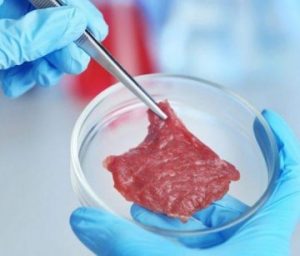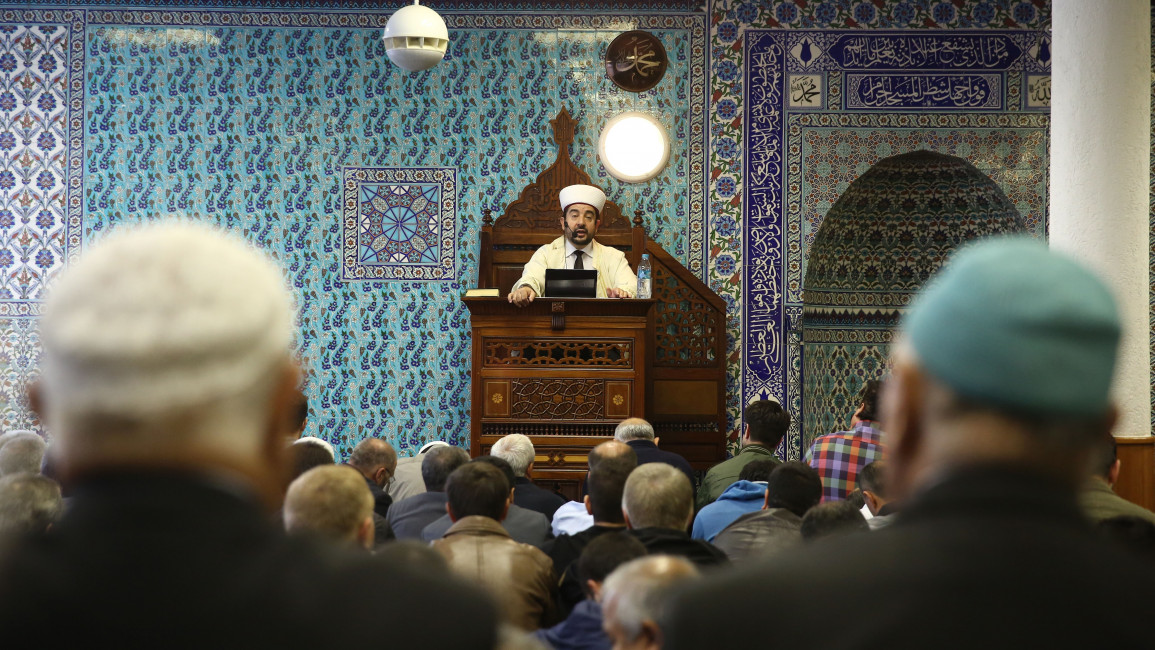- It will be permissible for Muslims to eat lab-cultivated meat based on a decision by the Islamic Religious Council of Singapore
- This is provided the cells are from animals that are halal or permissible in Islam, and the final ingredients do not have any non-halal components
- Such a move will make Singapore one of the first countries to produce cultivated meat and ensure it is halal for Muslims
- The use of artificial intelligence to do research on Islamic texts and laws will also be further studied
 SINGAPORE: It will be permissible, or halal, for Muslims to consume lab-cultivated meat if the cells are from animals that are also halal, and the final ingredients do not contain any non-halal components.
SINGAPORE: It will be permissible, or halal, for Muslims to consume lab-cultivated meat if the cells are from animals that are also halal, and the final ingredients do not contain any non-halal components.
Dr Nazirudin Mohd Nasir, the Mufti of Singapore, said that this decision is an example of how fatwa research has to evolve with modern technology and social change.
He was giving a speech on Friday (Feb 2) to launch a two-day conference on fatwa in contemporary societies.
In Islam, fatwas are religious rulings to guide the Muslim community on the various aspects of religious life and are formal interpretations of Islamic law by a qualified religious scholar known as a mufti.
Mr Masagos Zulkifli, Minister-in-charge of Muslim Affairs, told reporters on the sidelines of the conference that the issue of lab-cultivated meat had been studied by the Islamic Religious Council of Singapore (MUIS) since 2022, and that the fatwa for this decision by MUIS will be issued “soon”.
“We can be one of the first countries in the world to actually lead in this field, not only producing cultivated meat, but in also ensuring it is halal for Muslims to consume,” he added.
The fatwa has since been issued.
“Novel foods, which can be produced through more environmentally sustainable means compared to traditional agriculture and aquaculture, offer a practical way to contribute to environmental sustainability,” MUIS said in a media release on Feb 3.
It added that the religious guidance was developed because questions arose about its permissibility for Muslim consumption, after Singapore approved of the sale of cultivated meat products in here in 2020.
“There is a global impetus for alternative, sustainable food solutions. While still currently in the developmental stage, with the eventual emergence of novel foods, it is necessary to have a clear religious position early on the permissibility of consumption of such foods,” MUIS said.
The conference, held at the Parkroyal on Beach Road hotel, was attended by about 400 guests comprising international religious leaders, ambassadors, as well as religious and community leaders here. Deputy Prime Minister Heng Swee Keat was also present.
In a speech to launch the conference, Dr Nazirudin said that the religious authorities should allow for adjustments to its rulings as technological developments and social changes take place.
“We could certainly work towards an Islam that seeks to preserve and protect all human life, and secure all forms of well-being, instead of holding an exclusivist view that limits who and what we work with,” Singapore’s top Islamic leader said.
One such development is that of alternative food sources. Singapore is the first country in the world to approve the sale of lab-grown meat.
Dr Nazirudin said that while there are those who argue that there is no need for such food sources and that the Muslim community should continue to enjoy “real” food such as real meat, the Fatwa Committee of MUIS had carefully considered whether lab-cultivated meat is permissible for consumption by Muslims.
Previously, there was no Islamic ruling on whether lab-cultivated meat may be consumed by Muslims here.
Dr Nazirudin said that the committee, which he chairs, visited laboratories where meat is cultivated in bioreactors. He acknowledged that there were “a lot of new things to learn from the technology itself”.
“While these are originally animal cells, we are essentially dealing with something fundamentally different,” he said. “So how should we, in Islamic jurisprudence … treat something that looks familiar … yet is fundamentally different?
“When should we apply well-established principles and rules, and when do we have to think afresh?”
He said that one option is to play it safe and let future generations deal with the issue, but doing so will risk a larger crisis in the future.
“The committee decided that it is permissible, it is halal, to consume lab-cultivated meat where the cells are from animals that are halal or permissible in Islam, and where the final ingredients do not contain any non-halal components,” he added.

ARTIFICIAL INTELLIGENCE FOR FATWA RESEARCH
Dr Nazirudin also said that the Muslim community will need to contend with another novel issue, which is the role of artificial intelligence (AI).
For example, generative AI such as ChatGPT can help boost fatwa research and outreach in “comprehensive and responsible” ways.
“There are many possibilities, but also landmines. The onus is on us to figure out how it can enhance our work,” he added. “We are not suggesting for AI to replace the fatwa committee, the Mufti … some of us still need our jobs for now.”
Studies are underway on how to engineer and train large language AI models to look at Singapore’s fatwas and its methodologies, he noted.
“By doing this, generative AI can help us identify important dimensions and aspects of a new question or issue we want to deal with … We don’t want the AI to issue the fatwas, we want the AI to tell us what are the areas (we) must respond to and discuss when looking at a particular question.
“This will help us minimise gaps when issuing a fatwa.”
To this end, his team at the Office of the Mufti has embarked on an AI project with Google, supported by Smart Nation Singapore, an initiative by the Singapore Government to create solutions by harnessing technology.
The conference is the second edition of the inaugural one in 2017, and continues on Saturday with more discussions on lab-grown meat, AI, finance and medical technology.
This article was originally published in TODAY.
ARTICLE TWO – 12 February 2024
Not halal just yet: Singapore Islamic Council says ‘more rigorous’ parameters must be fulfilled for cultivated meat to be halal-certified
In early February 2024, the news that the MUIS Fatwa Committee had deemed cultivated meat consumption permissible as halal ‘under certain conditions’? was met with a warm welcome by the alternative protein industry.
Alternative protein think tank Good Food Institute (GFI) APAC described this as a ‘precedent-setting’ announcement, highlighting the importance of this in making cultivated meat more accessible to consumers globally.
“More than a billion people around the world adhere to halal food standards, so for cultivated meat to make the leap from novelty to the norm, it is crucial that there are viable pathways to achieve this certification,”? GFI APAC Managing Director Mirte Gosker said via a formal statement.
“Building a truly inclusive, efficient, and secure protein production system requires making high-quality, nutrient-rich, and culturally relevant foods available to every facet of society. ?
“With MUIS’s precedent-setting announcement, Singapore is bringing that bold vision one step closer to reality.”?
Whilst there can be no doubt that this is extremely positive news for the sector, the fatwa (or formal ruling on a point of Islamic law) on cultivated meat does not automatically mean that all such products can be considered halal upon production.
First off, it will need to fulfil several conditions as determined by the MUIS Fatwa Committee.
“The Fatwa Committee has concluded that [several] conditions must be fulfilled to ensure that cultivated meat is halal for consumption,”? MUIS stated via separate documentation.
“First, the cell source must be taken from animals that are halal to consume; second, every ingredient that makes up texture and composition of cultivated meat must be halal; and third, the product [must be] non-toxic and clean.”?
This ruling would automatically rule out cultivated pork as an option for Muslim consumers, and would certainly also call for much closer scrutiny of the production process.
“The fatwa provides the broad guidance and the fundamental principles in assessing the permissibility of cultivated meat for Muslim consumption [but] it is important to note that for any product to be halal-certified, a more rigorous set of requirements will need to be in place to ensure consumer assurance,”? MUIS Director of Halal Development Zalman Ali highlighted at a public discussion of the fatwa.
“These would include pre-market approval by the Singapore Food Agency covering food safety and more, cell traceability [to ensure the] cell comes from halal sources, ensuring the facility is free from contaminants and non-halal materials [so that] all ingredients used throughout the process are halal, ensuring there is no cross mixing with non-halal materials, incorporating a rigorous testing regime and proper product labelling.?
“These are some of the areas that would need to be further addressed in developing the guidelines for halal certification of cultivated meat.”?
Present and future?
When announcing the fatwa decision, Singapore Mufti (an Islamic scholar legally allowed to make rulings or issue fatwas) Dr Nazirudin Nasir stressed that fatwa research needs to examine new developments that contribute to a safer, more sustainable environment.
“Some argue that there is no need for alternative food sources today because they say we should continue to enjoy real food such as real meat – they are entitled to their choice [but for fatwa institutions] these are very difficult and complex questions,”? he said.
“These are not just about whether to force old views on new issues or allow new changes or technologies [but about] fostering confidence, resilience and empowerment in our religious thought.?
“The fatwa committee carefully considered not just the needs of the present but also the future [when deciding] that it is permissible and halal to consume cultivated meat which cells are from animals that are halal or permissible in Islam and final ingredients do not contain any non-halal components.”?



